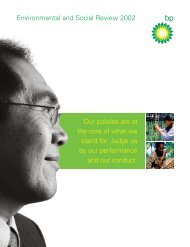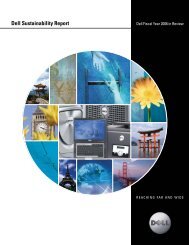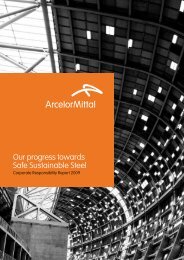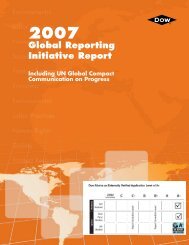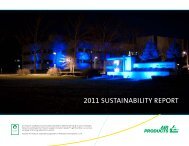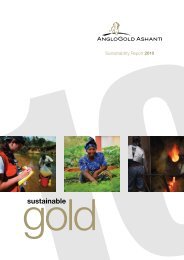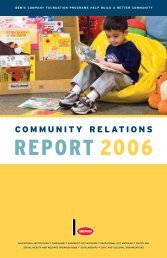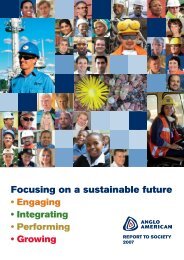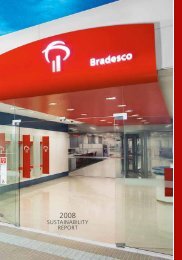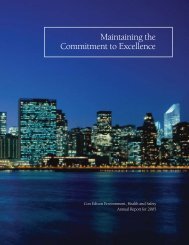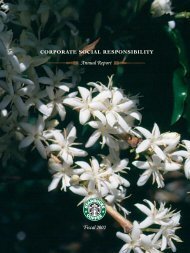Starbucks Corporation CORPORATE SOCIAL RESPONSIBILITY ...
Starbucks Corporation CORPORATE SOCIAL RESPONSIBILITY ...
Starbucks Corporation CORPORATE SOCIAL RESPONSIBILITY ...
Create successful ePaper yourself
Turn your PDF publications into a flip-book with our unique Google optimized e-Paper software.
C.A.F.E. Practices – The VerificationProcessWhen suppliers apply to C.A.F.E. Practices, they mustundergo an independent third-party evaluation to verifythe degree to which their practices are aligned with the 28criteria. Upon completion of each evaluation, the verifiersubmits a report along with a scorecard to the applicantand to <strong>Starbucks</strong> for review. The scores given by the verifierdetermine the supplier’s approval status in C.A.F.E. Practices.Evaluations involve field inspections, face-to-face interviewswith workers, document reviews and desk audits. Theconditions of a supplier’s status dictate the terms ofreverification. Reverification is periodically required in orderto measure continuity and sustainability improvements.Since launching C.A.F.E. Practices in 2004, <strong>Starbucks</strong> hasretained Scientific Certification Systems (SCS), a third-partyevaluation and certification firm, to help develop and overseethe verification system and conduct ongoing verifier trainings.By the end of fiscal 2006, SCS had trained 30 additionalindividual verifiers on how to evaluate and score suppliersagainst C.A.F.E. Practices’ comprehensive set of criteria.Independent verifiers for C.A.F.E. Practices are affiliatedwith 25 different organizations conducting verifications in19 countries.Economic TransparencyTo help assure that the farmer receives an equitable shareof the price paid by <strong>Starbucks</strong>, a requirement for economictransparency is included in our coffee contracts, includingall of our contracts with suppliers participating in C.A.F.E.Practices. This provision stipulates that our suppliers mustprovide credible evidence of payments, usually in the formof receipts indicating payments made at all levels along thecoffee supply chain, including prices paid to farmers. Infiscal 2006, 98 percent of our coffee contracts included aneconomic transparency clause requesting documentation ofpayments made to various participants in the supply chain.In 95 percent of these contracts, economic transparency wasrequired to the producer level.Requiring coffee suppliers to provide evidence of paymentswas almost inconceivable several years ago, especially giventhe diffused and complex nature of the coffee supply chainand the historical lack of record keeping. However, since<strong>Starbucks</strong> instituted this requirement, a notable change hasstarted to take place in the specialty coffee industry, withmore serious attention now being focused on assuring thatfarmers receive an equitable share of the purchase price. Webelieve this ultimately benefits coffee farmers and other keysuppliers who add value along the supply chain.While we are encouraged by the progress to date,institutionalizing this new requirement has come with certainchallenges. In particular, the coffee industry does not have astandardized mechanism in place that allows all parties acrossthe coffee supply chain to easily submit evidence of paymentin a consistent, uniform manner. At <strong>Starbucks</strong>, we receivedifferent forms of documentation – from a simple receiptfor the coffee cherries that the farmer delivered to the millto full purchase agreements that include more levels alongthe coffee supply chain. These documents not only differ inquality, they reflect variations in currency, industry standardsand laws, units of measure and are prepared in manydifferent languages.Despite these realities and the unique circumstances of eachproducing country, <strong>Starbucks</strong> will continue to work towardverifying the submitted evidence in order to assure thatfarmers received an equitable portion of the purchase price.<strong>Starbucks</strong> and Fair Trade<strong>Starbucks</strong> and the Fair Trade movement share commongoals: to help ensure that farmers receive a fair price for theircoffee and have improved access to international markets.C.A.F.E. Practices and the Fair Trade system both focuson cultivating long-term, stable relationships with farmers;providing supplemental funding for community projects;and providing farmers with access to affordable credit. Apoint of differentiation is that the Fair Trade coffee modelfocuses on smallholder farmers belonging to cooperativesand associations, while <strong>Starbucks</strong> purchases from coffeecooperatives, farms and supply networks of all sizes and scale.<strong>Starbucks</strong> first relationship with a Fair Trade certificationand licensing organization began in April 2000, when weestablished an agreement with TransFair USA that allowed<strong>Starbucks</strong> to purchase, roast and sell Fair Trade Certifiedcoffee. We are still actively engaged with TransFair USA, aswell as with Fairtrade Labelling Organizations International(FLO) and nine of the 20 other national initiatives aroundthe world that oversee and coordinate Fair Trade licensingand sales promotion in 24 of our international markets.Each Fair Trade national initiative is unique and has its ownrequirements, trademarks and protocols, a reality that hasconstrained our ability to offer Fair Trade Certified coffeeinternationally. <strong>Starbucks</strong> is committed to working togetherwith FLO and the national initiatives on a streamlinedsolution that will make it easier for multinational companies,like <strong>Starbucks</strong>, to distribute and sell Fair Trade Certifiedproducts in other countries.P R O D U C T S 23



